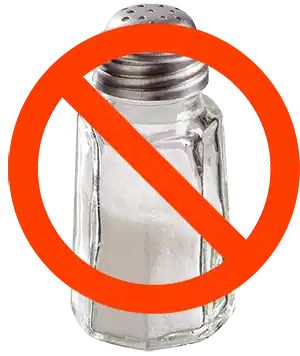A Flavorful Revolution in the Kitchen
Let’s face it—salt has been hogging the spotlight in our kitchens for far too long. This white, crystalline substance has had a stranglehold on our taste buds for centuries, making its way into nearly every dish with the promise of enhanced flavor. And, sure, salt can make a bland piece of chicken sing, but it’s also the culinary equivalent of a double-edged sword. Too much salt and you’re not just looking at a salty dish—you’re staring down the barrel of high blood pressure, heart disease, and a host of other health issues that are decidedly less tasty.
In fact, the average person consumes way more salt than is necessary. The recommended daily intake is about 2,300 milligrams (that’s about one teaspoon), but most of us are shaking our way well beyond that limit. It’s almost as if salt is the kitchen’s bad boy—addictive, a little dangerous, but somehow still irresistible.
Nature’s Flavor Bombs
But what if I told you there’s a way to jazz up your food without all the sodium-induced guilt? Enter herbs, the unsung heroes of the spice rack. Herbs are like the cool kids at school who were always doing their own thing—full of personality, natural charisma, and a knack for making everything better just by being there.
Herbs come in a dazzling array of flavors, from the bright and citrusy zing of cilantro to the deep, earthy warmth of rosemary. Unlike salt, which basically only offers one note (albeit a very effective one), herbs provide a symphony of tastes and aromas that can elevate your dishes to new heights. And the best part? They’re incredibly good for you. Packed with vitamins, antioxidants, and essential oils, herbs are like little leafy powerhouses that can help improve digestion, reduce inflammation, and even boost your immune system.
Take basil, for example. This fragrant herb doesn’t just make your pasta sauce sing—it’s also a great source of vitamin K, which is important for bone health. Or consider oregano, which not only gives pizza that authentic Mediterranean flavor but also contains compounds that have been shown to fight bacteria and viruses. It’s as if nature decided to package flavor and health benefits into one convenient, green bundle.
Herbs vs. Salt
So, what happens when you swap out that trusty salt shaker for a handful of fresh herbs? Well, your taste buds might just throw a little party. Imagine the subtle sweetness of fresh mint in a salad, the peppery kick of arugula in a sandwich, or the piney fragrance of thyme in a roasted chicken. Suddenly, your food isn’t just salty—it’s complex, aromatic, and downright interesting.
 But let's dig deeper into the flavor battle. Salt, as wonderful as it is for enhancing taste, has a fairly linear role in the kitchen. It’s the fixer-upper, the one-dimensional trick that makes flavors pop. However, it’s also a bit of a bully, overpowering other tastes if not used judiciously. It's the kind of friend who always dominates the conversation, leaving little room for others to shine.
But let's dig deeper into the flavor battle. Salt, as wonderful as it is for enhancing taste, has a fairly linear role in the kitchen. It’s the fixer-upper, the one-dimensional trick that makes flavors pop. However, it’s also a bit of a bully, overpowering other tastes if not used judiciously. It's the kind of friend who always dominates the conversation, leaving little room for others to shine.
Herbs, on the other hand, are like the conversationalists of the culinary world—they bring variety, nuance, and depth to the table. Each herb has its own unique voice, and when combined thoughtfully, they create a harmonious symphony of flavors that make your dishes sing. Where salt might hit your palate like a quick jab, herbs are more like a warm embrace, gently unfolding their flavors as you chew.
Take rosemary, for example. When you add it to roasted potatoes, it doesn’t just make them taste “salty”—it infuses them with a woodsy, aromatic flavor that lingers on your taste buds. Or think about cilantro in your salsa—it doesn’t just enhance the tomato's natural sweetness; it adds a fresh, citrusy note that dances on your palate. And let’s not forget about dill, which can turn a simple cucumber into a crunchy, herbaceous delight with just a sprinkle.
Another advantage herbs have over salt is their versatility. While salt is a one-trick pony, herbs can be used in endless ways. They can be chopped fresh over a dish for a burst of flavor, steeped in oils to create infusions, or even used dried to concentrate their essence. Each method brings out different aspects of the herb’s personality, giving you a toolkit of flavors to play with depending on what you’re cooking.
Moreover, herbs can bring out the natural flavors of ingredients in a way that salt simply can’t. For instance, basil in a Caprese salad doesn’t just season the tomatoes and mozzarella—it elevates the freshness of the tomatoes, enhances the creaminess of the cheese, and ties everything together with its fragrant sweetness. Salt might make these ingredients taste more like themselves, but basil makes them taste like the best version of themselves.
And here's another thing herbs have over salt: they add not just taste but texture, color, and even aroma to your dishes. Imagine a plate of pasta with nothing but a sprinkle of salt—sure, it might taste fine, but it’s visually and aromatically flat. Now picture that same pasta with a handful of chopped parsley or basil on top. The green flecks of herbs not only make the dish more visually appealing, but they also release aromatic oils that fill your kitchen with an irresistible scent, making the meal an experience for all your senses.
Herbs also allow you to cook with more creativity. They challenge you to think beyond just “seasoning” and into the realm of flavor building. You start asking questions like, “What does this dish need to feel complete?” rather than just reaching for the salt by default. It opens up a world of culinary exploration, where you can tailor each dish to your exact taste preferences without being stuck in the salty lane.
In the grand battle of herbs versus salt, it’s clear that herbs bring more to the table—literally. They enhance your dishes in ways that salt never could, adding layers of flavor, texture, and aroma that make every bite an adventure. So, while salt may have its place, it's time to give herbs the starring role they deserve in your kitchen. Not only will your food be more interesting, but you might just find that you're enjoying the art of cooking more, too.
Herb Hacks
If you’re new to the herb game, don’t worry—it’s easier than you think to start incorporating these flavor powerhouses into your cooking. Here are a few tips to help you get started:
- Grow Your Own: Fresh herbs are the best herbs. Consider starting a small herb garden on your windowsill or balcony. Basil, mint, parsley, and thyme are all easy to grow and can be snipped straight into your dishes.
- Experiment with Combinations: Don’t be afraid to mix and match herbs to create new flavor profiles. Basil and oregano are a classic combo for Italian dishes, while cilantro and mint work wonders in Asian-inspired cuisine.
- Use Herbs as a Garnish: A sprinkle of fresh herbs can add color and freshness to just about any dish. Try adding chopped parsley to soups, cilantro to tacos, or chives to scrambled eggs.
- Make Herb-Infused Oils: Create your own herb-infused oils by adding fresh herbs to olive oil. Use these flavorful oils for cooking, salad dressings, or as a dipping sauce for bread.
- Explore Dried Herbs: While fresh herbs are often preferred, dried herbs have their place too. Just remember that dried herbs are more concentrated, so you’ll need less than you would with fresh.
 The Verdict
The Verdict
More Herbs, Less Salt Day is a gentle reminder that while salt may have its place, it doesn’t need to be the star of every meal. By embracing herbs, you can create dishes that are not only bursting with flavor but also packed with health benefits. It’s time to let these green wonders shine and give your salt shaker a well-deserved rest.
So, the next time you reach for the salt, pause for a moment and consider the wonders of herbs instead. Whether you’re cooking up a storm in the kitchen or simply sprinkling a little magic onto your plate, herbs offer a world of possibilities that can transform your meals from ordinary to extraordinary—without the sodium overload. And let’s be honest, your heart (and your taste buds) will thank you for it.
Please Share our Content






 But let's dig deeper into the flavor battle. Salt, as wonderful as it is for enhancing taste, has a fairly linear role in the kitchen. It’s the fixer-upper, the one-dimensional trick that makes flavors pop. However, it’s also a bit of a bully, overpowering other tastes if not used judiciously. It's the kind of friend who always dominates the conversation, leaving little room for others to shine.
But let's dig deeper into the flavor battle. Salt, as wonderful as it is for enhancing taste, has a fairly linear role in the kitchen. It’s the fixer-upper, the one-dimensional trick that makes flavors pop. However, it’s also a bit of a bully, overpowering other tastes if not used judiciously. It's the kind of friend who always dominates the conversation, leaving little room for others to shine. The Verdict
The Verdict








 "Sláinte!" is a traditional Irish expression used as a toast, equivalent to "Cheers!" in English.
"Sláinte!" is a traditional Irish expression used as a toast, equivalent to "Cheers!" in English.